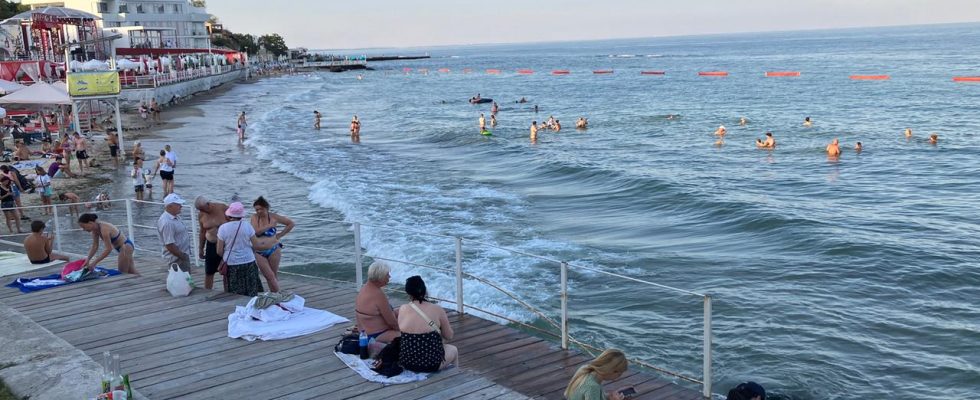report
Summer is coming to an end, also in Ukraine. But in Odessa on the Black Sea, the bathing season has only just opened: for a bit of joie de vivre in the war and against the economic slump.
Nine o’clock in the morning by the sea near Odessa: the sun is burning, the thermometer is approaching 30 degrees Celsius. It’s mid-August and yet Aliek is at the beach for the first time this year: the sleepless nights are getting on the sporty pensioner’s mind, especially lately. It’s the Russian attacks on the port of Odessa that keep Aliek and many other Odessites awake, even if they live outside the center of the Black Sea city.
Like Tetjana, who has just done her first lap in the water. “I can watch the attacks from my apartment at night,” says the slim, tanned woman in her mid-forties. “I look directly at the port.
But the Russian shelling is not the reason why the authorities are only now allowing bathing in the Black Sea, almost at the end of the season. Most of the city’s beaches are off the attack zone. And yet the month-long delay is also due to the Russian attacker.
billion cubic meters of polluted water
Marat Korolyov heads the city district with the largest number of beaches in Odessa. “After the destruction of the Kakhovka dam on the lower Dnipro on June 6, billions of cubic meters of polluted water spilled into the Black Sea. It would have been irresponsible to allow bathing,” he says.
While the Odessites jostled each other in the city’s swimming pools, the employees of the disease control agency went to the beaches every day – but not to swim, says department head Oleksandr Volkov: “After the dam burst, we immediately started checking the water and soil along the coast for pollutants to be tested – for viruses, bacteria, parasites, for chemical substances, heavy metal salts and radioactive substances.”
The tide had torn open cesspools and sewers on its way to the Black Sea, taking human and animal corpses with it. Within a few days, the scientists identified such high levels of contamination, mainly from feces, that the authorities had no choice but to close Odessa’s beaches. The water quality is now in line with hygiene regulations again.
Protective measures against floating mines
But there is another problem: the floating mines in the Black Sea. “Moles, buoys, nets – these three elements should keep the mines off the beaches,” says Korolyov about the protective measures. The nets are stretched out in the sea about 30 meters from the beach. “It’s a bit dangerous because of the mines. But now with the network everything is safe,” Tetjana is convinced.
The beach is one of six beaches along the Odessa coast that meet all the requirements for safe bathing. The lifeguard reports that many more people are coming to bathe again – not only locals, but also tourists. “We’re spending five days here by the sea to gain some distance from the war,” says Olena.
Signs reading “Dangerous mines!” warn on the beach in the Ukrainian Black Sea city of Odessa.
Tourism has collapsed
The city in eastern Ukraine is repeatedly exposed to heavy Russian rocket attacks. Odessa, the destination of millions of tourists from home and abroad every year until the Russian invasion, wants to alleviate the economic slump by opening the bathing season late.
“Beaches, discotheques, cafés, restaurants – they all made a living from tourism. Vacationers used to leave a lot of money here, companies benefited from it, it secured jobs and it flushed money into the city budget,” says Korolyov. Hotel rooms are now available in the middle of summer, a table is always available in the restaurant and there is a 70 percent discount on bathing suits.
Tourism in the Black Sea city has plummeted since the Russian invasion began. Instead of five million vacationers, Odessa now has a maximum of 500,000 a year. Aliek is also concerned with the consequences of the economic crisis, which the Russian war of aggression has torn Ukraine into: “Many people are out of work. And those who have work are also suffering. Pensioners like me are covered. But who is going to be unemployed now, everything is much more difficult for him than it used to be.” This is one of the reasons why the disappointment in Odessa was great when the beaches had to remain cordoned off in the spring.
The right to enjoy life
At least in the last few weeks of summer, people still want to enjoy the sea – and that’s why they swim on the dozens of beaches where neither moles nor nets keep out floating mines. “Of course there’s war and worries, but you live today. It doesn’t matter what’s tomorrow, what was yesterday. You just have to enjoy the moment,” says beach-goer Irene.
Wild bathing is an administrative offense, but the city administration can’t keep up with the controls, Korolyow admits, and “ultimately every person is responsible for themselves. We do our part and inform about the dangers and the measures to avert danger. But it stays always the human factor”.
The human factor is also the love for the hometown, at least for Sergej. The 29-year-old has been all over the world as second mate in a tanker fleet: “This is my first summer in Odessa in five years. I’ve been to America, Canada, Europe, Africa and China. I’ve been to the most beautiful beaches in the world. And the whole time I had this one dream: come home, go to the beach and finally swim in the Black Sea again.” The Odessites will not let the war rob them of their right to enjoy life.

